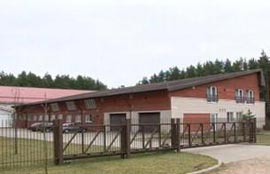EU – Baltic States, Legislation, Lithuania, USA
International Internet Magazine. Baltic States news & analytics
Friday, 13.06.2025, 22:00
CIA secret 'torture' prison found at fancy horseback riding academy in Lithuania
 Print version
Print version |
|---|
Lithuanian officials provided ABC News with the documents of what they called a CIA front company, Elite, LLC, which purchased the property and built the "black site" in 2004. Lithuania agreed to allow the CIA prison after President George W. Bush visited the country in 2002 and pledged support for Lithuania's efforts to join NATO. "The new members of NATO were so grateful for the U.S. role in getting them into that organization that they would do anything the U.S. asked for during that period," said former White House counterterrorism czar Richard Clarke, now an ABC News consultant.
"They were eager to please and eager to be cooperative on security and on intelligence matters." Lithuanian president Dalia Grybauskaite declined ABC's request for an interview. ABC News first reported that Lithuania was one of three eastern European countries, along with Poland and Romania, where the CIA secretly interrogated suspected high-value al-Qaeda terrorists, but until now the precise site had not been confirmed.
Read that report here. Until March 2004, the site was a riding academy and café owned by a local family. The facility is in the town of Antaviliai, in the forest 20 kilometers northeast of the city center of Vilnius, near an exclusive suburb where many government officials live. According to sources that saw the facility, the riding academy originally consisted of an indoor riding area with a red metallic roof, a stable and a cafe. The CIA built a thick concrete wall inside the riding area. Behind the wall, it built what one Lithuanian source called a "building within a building." Former CIA officials directly involved or briefed on the highly classified secret prison program tell ABC News that as many as eight suspects were held for more than a year in the Vilnius prison. Flight logs viewed by ABC News confirm that CIA planes made repeated flights into Lithuania during that period. In November 2005, after public disclosures about the program, the prison was closed, as was another "black site" in Romania. In August 2009, after ABC News reported the existence of the secret prison outside Vilnius, Lithuanian president Grybauskaite called for an investigation, reports ELTA/LETA.
"If this is true," Grybauskaite said, "Lithuania has to clean up, accept responsibility, apologize, and promise it will never happen again." At the time, a Lithuanian government official denied that his country had hosted a secret CIA facility. The CIA told ABC News that reporting the existence of the Lithuanian prison was "irresponsible" and declined to discuss the location of the prison. On Tuesday, the CIA again declined to talk about the prison. "The CIA's terrorist interrogation program is over," said CIA spokesman Paul Gimigliano. "This agency does not discuss publicly where detention facilities may or may not have been." Former CIA officials told ABC News that the prison in Lithuania was one of eight facilities the CIA set-up after 9/11 to detain and interrogate top al-Qaeda operatives captured around the world. Thailand, Romania, Poland, Morocco, and Afghanistan have also been identified as countries that housed secret prisons for the CIA.
President Barack Obama ordered all the sites closed shortly after taking office in January. The Lithuanian prison was the last "black" site opened in Europe, after the CIA's secret prison in Poland was closed down in late 2003 or early 2004. "It obviously took a lot of effort to keep [the prison] secret," said John Sifton, whose firm One World Research investigates human rights abuses. "There's a reason this stuff gets kept secret."








 «The Baltic Course» Is Sold and Stays in Business!
«The Baltic Course» Is Sold and Stays in Business!

